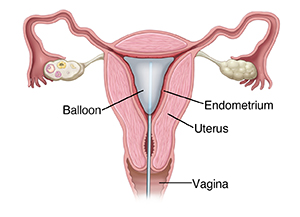Endometrial Ablation
Endometrial Ablation

Preparing for surgery
You may be given medicine by mouth or injection for a few weeks or months before your surgery. This thins the lining of the uterus and reduces bleeding.
Your healthcare provider may recommend other procedures to check the inside of your uterus before the ablation is done.
The day before surgery, you may be given medicine or a special substance (laminaria) may be put into the opening to the uterus (cervix). This widens the opening.
To help prevent problems with anesthesia, do not eat or drink anything 10 hours before surgery.
Your surgery
You’ll be given anesthesia so you stay comfortable and relaxed. You will not feel pain during surgery.
Your uterus may be filled with fluid. This puts pressure on the lining to help reduce bleeding. It also allows your healthcare provider to see inside your uterus.
Your healthcare provider puts a small telescope-like instrument through the cervix. This scope may be connected to a video monitor. This helps your healthcare provider see and control the ablation process. At the end of the scope, a device using heat, extreme cold, or electric current destroys the uterine lining. Instead of the scope, your healthcare provider may use another device that both expands and destroys the uterine lining. After being inserted into your uterus, it also uses heat or other energy to destroy the lining. Your healthcare provider will choose the device that’s best for you.
Your recovery
You may have cramping or aching in your abdomen after surgery. Your healthcare provider can give you pain medicine.
You may also have a bloody or watery discharge or bleeding for days or weeks. Use sanitary pads, not tampons.
Don’t have sex or play active sports for 2 weeks after surgery.
You can likely return to work in 2 days.
Ask your healthcare provider about using contraception after an ablation.
Your healthcare provider will see you in about 6 weeks to check how well you are healing.
Call your healthcare provider if you have any of the following after surgery:
Chills
Fever of 100.4°F (38°C) or higher, or as directed by your healthcare provider
Frequent urination for 24 hours
Heavy vaginal bleeding
Nausea
Persistent or increased abdominal pain
Shortness of breath
Updated:
March 30, 2018
Sources:
An overview of endometrial ablation. UpToDate., Endometrial Ablation. American College of Obstetricians and Gynecologists, Endometrial ablation: Non-resectoscopic techniques. UpToDate., Patient information: Endometrial ablation (The Basics). UpToDate.
Reviewed By:
Burd, Irina, MD, PhD,Goode, Paula, RN, BSN, MSN,Image reviewed by StayWell medical illustration team.